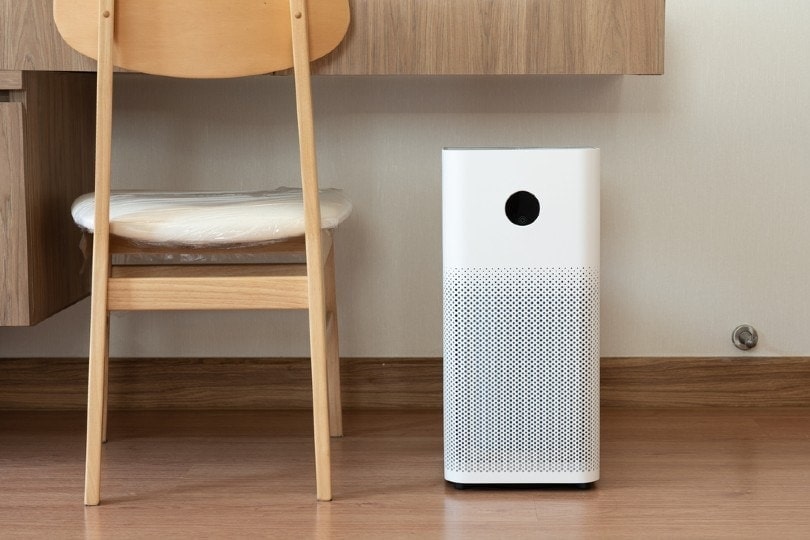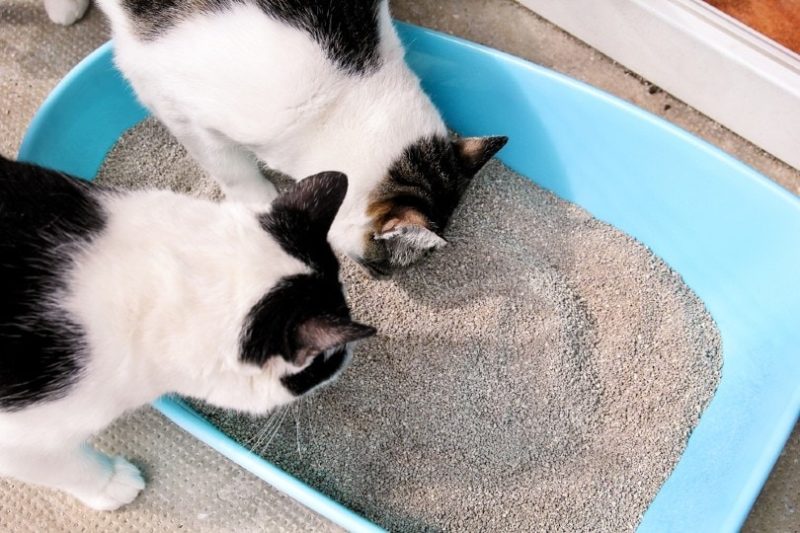Silver Savannah Cat: History, Info, & Traits (With Pictures)
Updated on
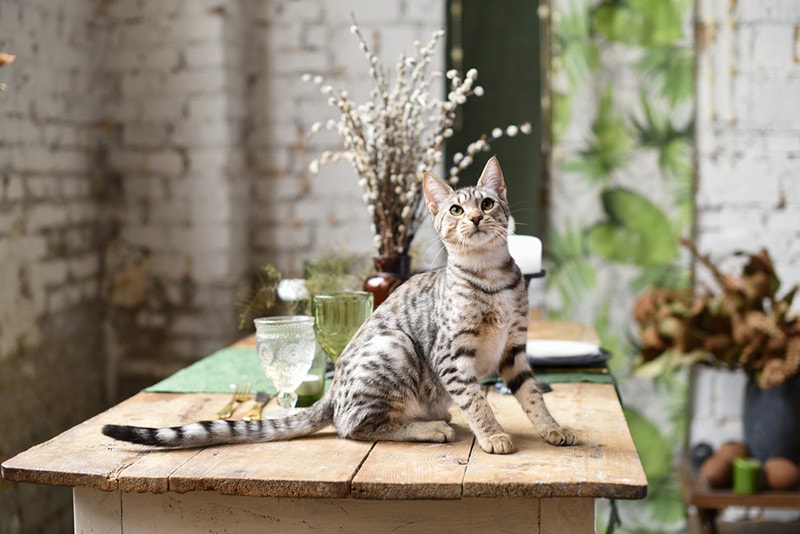
The Savannah cat is a hybrid cat breed that is the result of crossbreeding the Serval with the domesticated cat. The silver Savannah cat is considered a pseudo breed only because this is a recognized coat color found in the Savannah breed, rather than being a breed itself.
According to top breeders, silver Savannah cats are considered the second most popular coat color. They display either silver or gray fur with striking black spotting. Keep reading to learn more about these incredible animals and how they came to be.
The Earliest Records of the Silver Savannah Cat in History
While there is no specific date of record for the development of the silver Savannah cat, the first ever Savannah cat was born on April 7, 1986. Breeder Judee Frank crossbred a male African Serval belonging to Suzi Woods with a domesticated, purebred Siamese cat.
Silver Savannah cats result from selective breeding and these cats come in a variety of silver and gray shades with solid black spots. The silver results from both the agouti gene and the inhibitor gene that dilutes coat color.
To produce silver Savannah kittens, one of the parents must be a silver Savannah. This coat color cannot be produced from Savannahs of other colors, even if they have silvers in their ancestry.
How the Silver Savannah Cat Gained Popularity
During the 1990s the Savannah cat became very popular among cat breeders but not so much among the general public. Once they became a recognized breed in the 2000s, their popularity began to soar. Not only did this rapid popularity result from their exotic looks but also their unique personality traits.
Savannahs are most often associated with the traditional coat color but the demand for silver Savannahs has dramatically increased since people have begun learning more and more about the breed.
Formal Recognition of the Savannah Cat
After the successful breeding of the first Savannah kitten, breeders Patrick Kelley and Joyce Sroufe wrote the original version of the Savannah breed standard and presented it to The International Cat Association board. In 2001 the board accepted the breed for registration, but it wasn’t until 2012 that the Savannah was accepted as a championship breed.
Only SBT (Stud Book Traditional) level cats can be accepted for show, which means only filial generations 4 through 8 are eligible. While the breed has many different colors and patterns, TICA breed standards only accept spotted patterns with certain colors and color combinations.
Top 10 Unique Facts About Savannah Cats
1. They Get the Name “Savannah” from the First Kitten Ever Produced
The very first Savannah cat was achieved by crossing a wild African serval with a domestic Siamese cat back in the 1980s. The first kitten born was named Savannah, which is where the breed got its name.
2. Savannah Cats Are Categorized by Filial Generation
Since the breed is produced by crossbreeding servals and domestic cats, each generation of Savannahs is marked with what is known as a filial number. Kittens produced directly from a serval and a domestic cat are considered an F1 Savannah because they are 50% serval and the closest generation to their wild roots.
3. F1 Savannahs Are Difficult to Breed
F1 Savannah cats are incredibly difficult to breed because of the genetic differences between Servals and the domesticated cat and the difference in gestation period between the two. Pregnancies are often unsuccessful and kittens from this kind of pairing are often born prematurely.
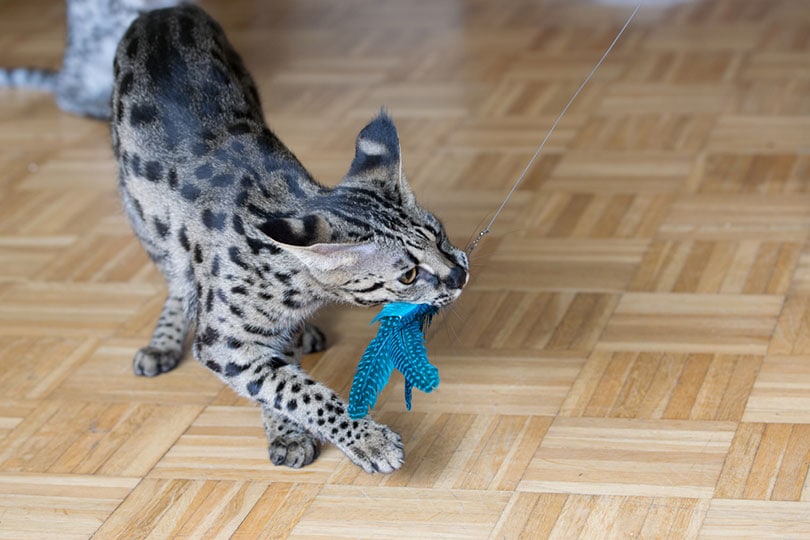
4. They Have Very Unique Personalities
Savannah cats are incredibly inquisitive, and intelligent, and are known for having personalities similar to dogs. If properly trained, these cats can learn simple commands and will even enjoy fetching, puzzle toys, and much more. They enjoy exploring and will often learn how to open doors and cabinets throughout the house.
These cats are also incredibly loyal and form strong bonds with their owners. They may even display a bit of a protective nature and could be wary of strangers. This is a breed that should be socialized at an early age and exposed to a variety of people, animals, and situations.
5. Savannah Cats Love Water
This breed is already known for being more dog-like than cat-like and another reason is that they are known for enjoying the water. Savannahs will try and join in the bath and shower and will absolutely love playing and swimming in any water they gain access to. Of course, this love for water can vary by individual.
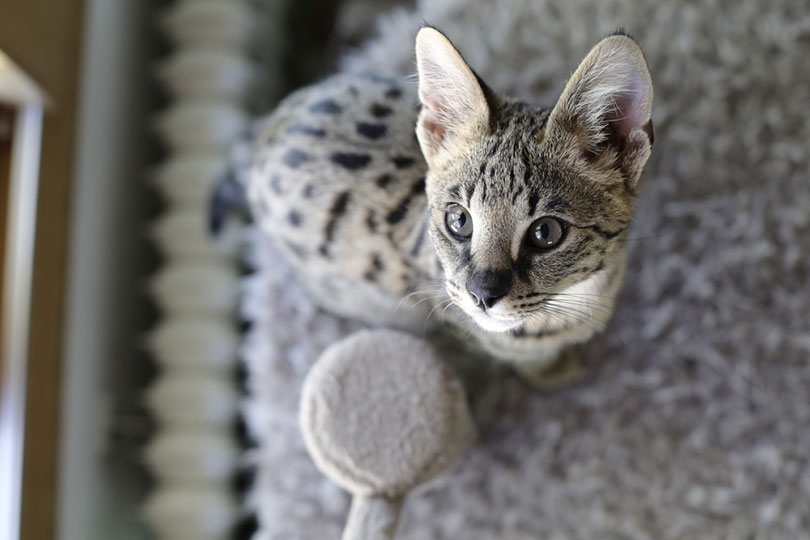
6. The Breed is Full of Energy
The Savannah cat is known for being very active and energetic. This is not a lazy housecat—but more like a high-speed playmate that will enjoy different kinds of exercise and mental stimulation. Since they require a lot of physical activity and human interaction, they should only be placed with families that can meet their unique needs.
7. Many Owners Will Leash Train Their Savannahs
Savannahs are different from your average domesticated cat—not only can they learn a lot of tricks and commands, but they can also be taught to walk on a leash. This is great, considering it gives them a chance to explore and get some much-needed exercise safely outside the home.
Leash training isn’t always easy and requires patience and commitment. While these cats have a lot of dog-like traits, keep in mind they are still cats and will require a special harness and leash that is made for their body type.
8. They Are Incredible Jumpers
Savannah cats are incredible athletes, and it comes as no surprise that their jumping abilities are superior. These cats are known for jumping up onto tall cabinets, refrigerators, and other high surfaces in the house that most housecats don’t bother.
They can jump an impressive 8 feet from a standing position, so it’s recommended that owners provide them with lots of vertical spaces to enjoy throughout the home.
9. Savannahs Are Expensive
Those interested in purchasing a Savannah cat should expect to pay a pretty penny for these animals. On average, a Savannah will cost anywhere from $1,500 up to $20,000 or more. Prices will vary depending on filial generation, gender, color, and show quality.
Filial generations F1 through F3 are the most expensive due to how closely related they are to their wild ancestry and the associated breeding difficulties. Males in these generations are typically sterile, making females incredibly valuable.
https://www.instagram.com/p/CbcQgdxLYME/
10. There May Be Legal Restrictions with Ownership
Because the Savannah is so closely related to the wild African Serval, they may be classified as exotic animals and there could legal restrictions with ownership depending on your area. This is especially true for filial generations F1 through F3. Always check with your state and local laws regarding ownership before you ever commit to purchasing a Savannah cat.
Does a Silver Savannah Cat Make a Good Pet?
Silver Savannah cats have the potential to make excellent family pets and their striking looks will leave anyone impressed. They are extremely active and social, making them ideal for those wanting an energetic companion that thrives on play and human interaction. They have a desire for adventure and can be a bit mischievous at times.
They also have more extensive needs compared to your regular housecat because of their need for exercise and socialization, which should be taken into deep consideration before bringing one home. They are incredibly loyal cats that will form strong bonds with their owners and will want to remain close by.
They do not have any special dietary requirements unless otherwise advised by a veterinarian. Their diet should consist of high-quality cat food that is appropriate for their age and activity level. Grooming needs are minimal since their coats are very short and manageable.
Savannah cats typically do very well in houses with older children and other pets, including dogs. They may be a bit too rambunctious around smaller children, so it’s recommended that extra caution be taken in households with little ones.
Conclusion
The silver Savannah cat is a stunning coat color found in the breed that comes in varying shades of silver and gray with rich black spots. They are one of the most popular coat colors, second only to the traditional coloration. The breed was first developed in the 1980s and has continued to grow in popularity throughout the years due to its dog-like personality, incredible athleticism, and stunning exotic looks.
Featured Image Credit: Yana Vydrenkova, Shutterstock


